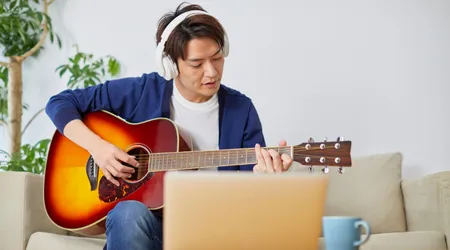Best free apps for studying music at home

You free apps to study music at home emerge as powerful allies for musicians of all levels, transforming smartphones and tablets into true virtual classrooms.
Advertisements
The pursuit of musical knowledge has never been so accessible. In 2025, technology democratized learning, putting a universe of resources at your fingertips.
The musical journey, previously restricted to in-person classes and textbooks, is now expanding into the digital environment.
These apps offer interactive and personalized tools, adapting to the pace and needs of each student, from the curious beginner to the experienced musician looking to improve.
Essential Tools for the Modern Musician
The convenience of having a tuner, metronome and chord dictionary in the same device is undeniable.
Advertisements
These basic resources, when offered free of charge, enhance the study experience, allowing practice to be more efficient and productive, anywhere and anytime.
Read more: Home Recording Techniques: How to Record Guitar Without Hiss
Music Theory Demystified in Your Pocket
Music theory, often seen as an obstacle, becomes playful and understandable through intuitive interfaces.
Gamified apps transform learning scales, intervals, and harmony into an engaging challenge, encouraging memorization and practical application.

The Science Behind Harmony and Melody
Understanding the relationship between notes and chords is crucial. Several apps offer interactive lessons that explain complex concepts clearly, using audio and visual examples.
A study from Berklee College of Music, for example, highlighted how technology-based music learning can significantly improve knowledge retention.
++ How to learn to read sheet music from scratch in 7 steps
Exercising Your Ear and Music Reading
Auditory perception and sight-reading are crucial skills.
Ear training tools help identify intervals and chords, while interactive music readers make it easy to decode notes.
This constant practice strengthens the connection between what is heard and what is read.
Mastering Your Instrument with Dedicated Apps
Each instrument has its own particularities, and technology offers tailor-made solutions.
Whether for guitar, piano, drums, or wind instruments, there are apps designed to help with technical development and repertoire performance.
++ How to Understand Greek Modes Without Being a Crazy Theorist
The Piano Within Everyone's Reach
For keyboard enthusiasts, apps simulate digital pianos with high fidelity.
Many of them include interactive tutorials that guide learning, from the first notes to the execution of complex pieces. It's like having a private tutor available 24/7.
A notable example is Yousician, which uses your device's microphone to “listen” to your performance and provide instant feedback, making practice more effective.
This gamified approach turns studying into a fun game.
++ 8 essential (and free!) apps for studying and learning music
Singing Strings with Smart Tutorials
Guitarists and bassists find a wide range of options. High-quality video tutorials, interactive tabs, and accurate tuners are just some of the resources available.
Those free apps to study music at home are true guides.
Chordify, for example, analyzes your favorite songs and displays the chords in real time, making it easy to learn popular songs.
This tool is a perfect analogy for a conductor who discreetly points out notes for the musicians to follow.
Practice and Performance: Tools for Constant Evolution
Regular practice is the cornerstone of musical development.
Apps that function as recorders, advanced metronomes, and playlist organizers are essential for tracking progress and maintaining discipline.
The Power of the Metronome and Smart Tuner
Rhythmic control and correct tuning are the foundation of any good musician.
Metronomes with rhythmic subdivision options and chromatic tuners that recognize a wide range of notes offer invaluable accuracy for rehearsals.
Recording Your Ideas and Evolution
Capturing your performances allows for critical self-analysis.
Audio recorders built into many free apps allow you to record study excerpts or compositions, making it easier to identify areas for improvement.
Those free apps to study music at home are tools for self-knowledge.
The ability to record and listen to yourself is powerful. Imagine a sculptor who, with each stroke, observes the result in a mirror to refine his work.
This constant self-assessment is a crucial differentiator. According to the MusicRadar portal, approximately 701% of amateur musicians use apps to aid their daily practices.
Accessibility and Inclusion in Music Education
Making these resources free removes financial barriers, democratizing access to quality music education.
Young talent in regions with less infrastructure or those with limited budgets now have the opportunity to pursue their musical dreams.
Overcoming Geographical and Financial Limitations
Learning music no longer has to be a privilege.
With a smartphone and an internet connection, anyone can start or enhance their musical journey, exploring new techniques and styles at no additional cost.
You free apps to study music at home open doors.
Personalizing Learning for Each Individual
Every student has a unique learning style.
The diversity of applications allows you to choose those that best adapt to your way of absorbing knowledge, whether through visual, auditory, or interactive exercises.
These free apps to study music at home are proof that talent can flourish anywhere, given the right opportunity and tools.
Isn't it wonderful to think of how many new melodies and harmonies are being created right now, powered by this accessible technology?
We believe that music has the power to transform lives.
By leveraging the resources available, you not only hone your skills, but also connect with a global community of sound enthusiasts.
These free apps to study music at home are your partners in this melody.
Conclusion: The Future of Music is Now and It's in Your Hands
Technology has radically shaped the way we learn and practice music.
You free apps to study music at home are not mere tools; they are portals to a universe of continuous learning, creativity and improvement.
By embracing these innovations, you are investing in your musical development and paving the way for a future full of sounds and achievements.
Frequently Asked Questions
What types of instruments benefit most from these applications?
Most music theory and ear training apps are universal. For specific instruments, such as guitar, piano, and drums, there are dedicated software programs that offer tutorials and practical exercises.
Is it possible to learn to play an instrument from scratch using only free apps?
Yes, it's entirely possible to start your musical journey using apps. They provide the theoretical foundation, practical exercises, and initial feedback.
However, for further development and to correct postural or technical defects, classes with a qualified teacher remain valuable.
What are the main benefits of using apps over traditional methods?
Accessibility, free access, interactivity, instant feedback, and flexible schedules are major advantages. Apps make studying more dynamic and adaptable to the student's pace.
Do these apps replace the need for a music teacher?
Not necessarily. Apps are excellent supplements and self-study tools.
They can meet the need for a teacher for beginners or for those looking to improve specific skills.
However, the guidance of an experienced teacher is irreplaceable for refined technical development and a deeper understanding of musicality.
